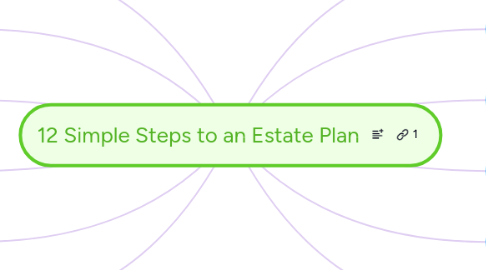
1. 1. Will
1.1. Information
1.1.1. When a Basic Will Is Enough
1.1.2. Will a Basic Will Avoid Probate?
1.1.3. Is a Basic Will for You?
1.1.4. How to Create a Basic Will
1.2. Sample
2. 2. Trust
2.1. Information
2.1.1. What is a living trust?
2.1.2. Why should I make a living trust?
2.1.3. How does a living trust avoid probate?
2.1.4. Is it expensive to create a living trust?
2.1.5. Is it a hassle to hold property in a living trust?
2.1.6. Is a living trust document ever made public, like a will?
2.1.7. Does a living trust protect property from creditors?
2.1.8. If I make a living trust, do I still need a will?
2.1.9. Can a living trust reduce estate taxes?
2.2. Sample
3. 5. Inheritance for children
3.1. Information
3.1.1. What Happens Without Property Management
3.1.2. Options for Property Management
3.1.2.1. 1. Name a Property Guardian in Your Will
3.1.2.2. 2. Name a Custodian Under the Uniform Transfers to Minors Act
3.1.2.2.1. Using Life Insurance to Provide for Children
3.1.2.3. 3. Set Up a Trust for Each Child
3.1.2.4. 4. Set Up a 'Pot Trust' for Your Children
4. 9. Funeral Expences
4.1. Information
5. 8. Estate Taxes
5.1. Information
5.1.1. Will my estate have to pay federal estate tax after I die?
5.1.2. What is the tax rate for taxable estates?
5.1.3. Are there ways to avoid federal estate taxes?
5.1.4. Can't I just give all my property away before I die and avoid estate taxes?
5.1.5. Do some states impose estate tax?
5.1.6. Can I avoid paying state estate or inheritance taxes?
6. 3. Health Care Directives
6.1. Information
6.1.1. Types of Health Care Documents
6.1.1.1. Living Wills
6.1.1.2. Powers of Attorney for Health Care
6.1.2. Who Can Make Health Care Documents
6.1.3. When Your Health Care Documents Take Effect
6.1.4. When Your Health Care Documents End
7. 4. Financial Power of Atttorney
7.1. Information
7.1.1. Why Sign a Power of Attorney
7.1.2. Avoiding Conservatorship or Guardianship Proceedings
7.1.3. If You Think You Don't Need a Durable Power of Attorney
7.1.4. If You Are Married
7.1.5. If You Have a Living Trust
7.1.6. If You Own Joint Tenancy Property
7.1.7. When You Shouldn't Rely on a Durable Power of Attorney
7.1.8. You Want Court Supervision of Your Finances
7.1.9. You Fear Family Fights
8. 6. Beneficiary Forms
8.1. Information
8.1.1. How to Avoid Probate
8.1.1.1. Revocable Living Trust
8.1.1.2. Pay-on-Death Accounts and Registrations
8.1.1.3. Joint Ownership of Property
8.1.1.4. Gifts
8.1.1.5. Simplified Procedures for Small Estates
8.1.2. 8 Ways to Avoid Probate
9. 7. Life Insurance
9.1. Information
9.1.1. Long-Term Needs
9.1.1.1. How many people depend on your earning capacity?
9.1.1.2. How much money would your dependents need for living expenses?
9.1.1.3. How long would it take for your dependents to be come self-sufficient?
9.1.2. Short-Term Needs
9.1.2.1. What assets will be available to take care of your dependents' immediate financial needs?
9.1.2.2. After you die, how long will it be before your property is turned over to your inheritors?
9.1.2.3. Will your estate owe substantial debts and taxes after your death?
9.1.3. Avoid Probate and Estate Taxes on Life Insurance
9.1.3.1. Avoiding probate
9.1.3.2. Avoiding estate taxes
9.1.4. Business Needs
9.1.4.1. Example
10. 10. Final Arrangements
10.1. Information
10.1.1. Why should I leave written instructions about my final ceremonies and the disposition of my body?
10.1.2. Why not leave instructions for my final ceremonies and the disposition of my body in my will?
10.1.3. Where is the best place to leave written instructions for my final arrangements?
10.1.4. Why should I leave written instructions for my final ceremonies and the disposition of my body?
10.1.5. What details should I include in a final arrangements document?
10.1.6. What services can I expect from a mortuary?
10.1.7. Where can I turn for help in choosing cost-effective mortuary services and burial arrangements?
11. 11. Business Protection
11.1. Information
11.1.1. What Is a Buyout, or Buy-Sell, Agreement?
11.1.2. Events Covered Under a Buyout Agreement
11.1.3. Why You Need a Buyout Agreement
12. 12. Documents
12.1. Will
12.2. Trusts
12.3. Insurance Policies
12.4. Real Estate Deeds
12.5. Certificates for Stocks, Bonds, Annuities
12.6. Bonds
12.7. Annuities
12.8. Bank Accounts
12.9. Mutual Funds
12.10. Safe Deposit Boxes
12.11. Retirement Plans
12.11.1. 401K
12.11.2. IRA
12.12. Debt
12.12.1. Credit Cards
12.12.2. Mortgage and Loans
12.12.3. Utilities
12.12.4. Unpaid Taxes
